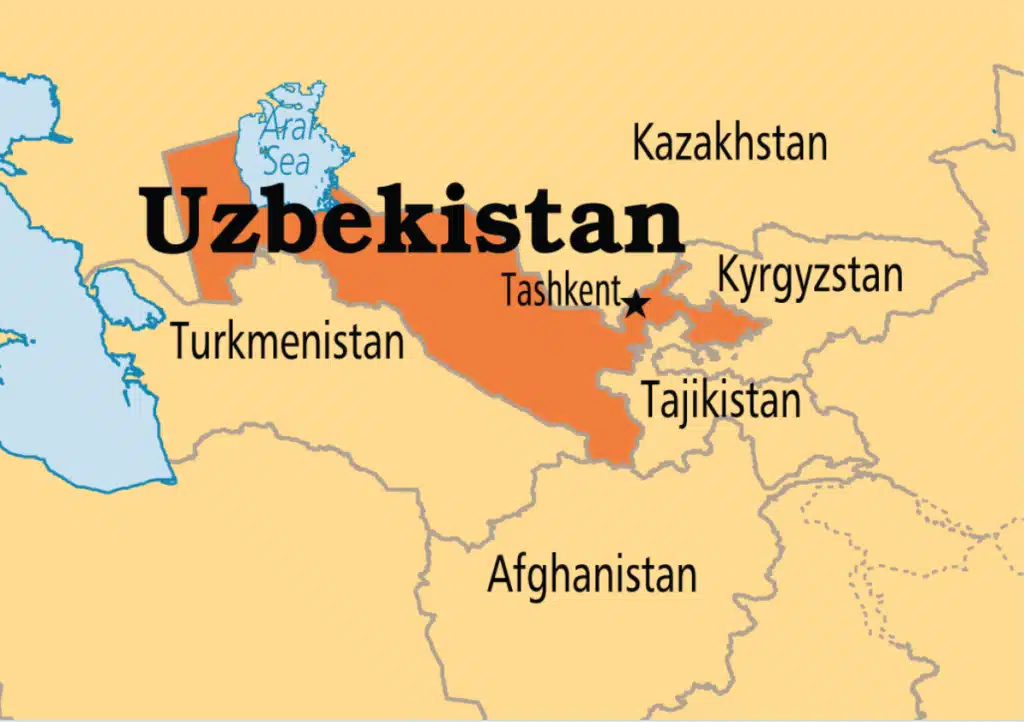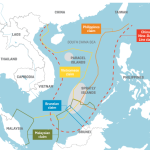
Uzbekistan is one of the countries in central Asia. Its capital is Tashkent, and it is right next to the Aral Sea. The land of Uzbekistan is a strange mix of flat fields and high mountains. India’s relationship with the country has always been friendly, and both countries stand to gain a lot in many ways.
Table of Contents
Historical Background
India and Uzbekistan have had many things in common throughout history, such as: • Parts of what is now Uzbekistan are often called Kamboja in Pali and Sanskrit texts.
The ancient trade road Uttarpath went through Uzbekistan. It went through Fergana, Samarkand, and Bukhara. Buddhism is said to have travelled to China through Uzbekistan and Central Asia. Some famous Indians with Uzbek roots are Mirza Ghalib and Amir Khusro.
Areas of Cooperation
Political
India and Uzbekistan had close ties when Uzbekistan was part of the USSR. Indian leaders often went to Tashkent and other places in Uzbekistan. On July 11, 1966, Lai Bahadur Shastri, who had been Prime Minister before, died in Tashkent. He had just signed the Tashkent statement with Pakistan. After Uzbekistan got rid of the USSR, past Indian Prime Ministers P.V. Narasimha Rao and Manmohan Singh led other high-level delegations to Uzbekistan in 1993 and 2006.
• The most recent visit was by Prime Minister Narendra Modi, who signed a number of deals and memorandums of understanding about trade, fighting terrorism, and other things.
• On September 30 and October 1, 2018, President of the Republic of Uzbekistan Shavkat Mirziyoyev made a State visit to India. India and Uzbekistan signed 17 memorandums of understanding (MoUs) to start a new chapter in their relationship in different areas.
Economic
• The Agreement on Trade and Economic Cooperation, which was signed in May 1993, sets the rules for how India and Uzbekistan do business with each other. This agreement includes things like mutual MFN treatment, the promotion of economic, industrial, scientific, and technical cooperation, including the active involvement of small and medium-sized businesses in bilateral economic cooperation, and countertrade, among other things.
• In 1993, India and Uzbekistan signed an agreement to avoid double taxation. In May 1999, they signed an agreement to promote and protect bilateral investments.
• The value of trade has grown by 38.5%, from USD 247 million in 2019-20 to USD 342 million in 2021-22.
• The India-Uzbekistan Business Council, for which an agreement was made in October 2018, will work to improve business ties between the two countries. Both India and Uzbekistan decided to set up a group of experts to do a Joint Feasibility Study and start talks for an India-Uzbekistan Preferential Trade Agreement by the end of 2018.
• A deal made in 2014 says that Uzbekistan will get 2,000 metric tonnes of uranium over the next four years, from 2014 to 2018. During Prime Minister Narendra Modi’s visit, an agreement was reached on a wide range of topics, including how to deepen strategic relations between Uzbekistan and India, how to work together in a way that benefits both countries, and how to work together on international and regional issues that both countries care about.
Investments
Indian companies have invested in pharmaceuticals, amusement parks, car parts, and the hospitality industry, among other things. Amity University and Sharda University have opened campuses in Tashkent and Andijan, respectively.
• Indian organisations like iCreate are working closely with their Uzbek colleagues to build a startup ecosystem in Uzbekistan and teach entrepreneurs how to set up incubators.
Defence:
Dustlik was the name of the first military drill that India and Uzbekistan did together.
India has also helped the Armed Forces Academy of Uzbekistan in Tashkent set up a “India Room.”
Security:
• India and Uzbekistan have similar views on a number of security issues, such as terrorism, transnational organised crime, illegal trafficking, smuggling, etc.
• The main goal of their work in this area has been to help Uzbek security agencies by training them and building up their abilities.
Cultural:
In Tashkent, a place called the Lai Bahadur Shastri Centre for Indian Culture was set up in 1995. It is run by the Indian Council for Cultural Relations (ICCR), and there are many cultural events there.
• There are three Uzbek schools in all of Uzbekistan that teach the Hindi language at all levels, from elementary school to graduate school.
• There are now direct trips between Tashkent and Mumbai, which makes it easier for people to meet each other.
Tourism:
The Uzbek government has made it possible for Indian tourists to get an e-Visa.
• Uzbekistan has become a major source of medical tourism, with about 8,000 Uzbeks going to India every year to get medical care.
Solar Power:
• Uzbekistan has said it wants to join the International Solar Alliance.
• Competitive bidding could be a way for India to take part in building up the solar power business.
Significance of Uzbekistan to India
• Uzbekistan has a lot of uranium, which can help India keep its nuclear power plant running and reach its goals for getting more people on the power grid.
As a country with a lot of energy resources, Uzbekistan can help India become less reliant on one country to meet its energy needs. It is also a good place to invest in infrastructure for better regional connections, which can help India increase its trade exports. India has shown that it is very interested in the Ashgabat Agreement, which is a transit pact between Uzbekistan, Iran, Turkmenistan, and Oman that was made in 2011. Uzbekistan has backed India’s membership in the Ashgabat Agreement. As a result, India signed the deal on February 2, 2018.
• If relations between the two countries are good, India will be able to get help from foreign groups like the SCO and the UN. It could also help India win support for a stable seat at the UN.
Significance of India to Uzbekistan
India is important to Uzbekistan because it is the world’s biggest democracy and a rising power. Uzbekistan needs India’s help to make sure the country stays stable and grows.
India’s service sector, especially the IT sector, can help Uzbekistan’s service sector grow. India is one of the biggest producers of generic medicine. So, it can help Uzbekistan build up its pharmaceutical business and end many diseases that can kill people.
Challenges in Relations
• Even though there is a lot of promise, there hasn’t been much trade or investment between the two countries.
Uzbekistan is a landlocked country with poor air connections.
• The rise of fundamentalism and ISIS makes it hard for India to achieve its strategic goals in the area.
• The Belt and Road Initiative has helped China make progress in all of the central Asian countries, including Uzbekistan.
Future Prospects:
• The two countries should increase and strengthen their long-term cooperation in many areas, including politics, security (including cyber security), counter-terrorism, trade and investment, science and technology, and culture ties. The International North-South Transport Corridor should try to get Uzbekistan to join.
Way Forward
• Indian companies can take advantage of Uzbekistan’s many trade agreements and set up mutually beneficial business projects in the area to take advantage of the country’s economic and trade potential.There needs to be more agreement between the two countries.
• The International North-South Transport Corridor (INSTC) should include Uzbekistan. With Iran and India already part of INSTC, adding Uzbekistan will move things in the right way, especially in terms of connectivity.

![Ganesh Kumar Bhaskar [UPSC Topper 2019] Biography Age, Family, Marksheet, Optional & More images-2B-252879-2529.jpeg](https://iasbio.com/wp-content/uploads/2020/11/images-2B-252879-2529.jpeg)

![Jeydev CS [IAS Topper] Biography, optional, marksheet, Wiki, Age, Caste, Family & More images-2B-252877-2529.jpeg](https://iasbio.com/wp-content/uploads/2020/11/images-2B-252877-2529.jpeg)


![UPSC CSE Topper Mains Answer [Gaurav Agarwal] word-image-10753-1](https://iasbio.com/wp-content/uploads/2023/06/word-image-10753-1-150x150.png)

![UPSC CSE Topper Mains Answer [Part 1] images-2023-06-17T191749.185](https://iasbio.com/wp-content/uploads/2023/06/images-2023-06-17T191749.185-150x150.jpeg)







![Abhishek Saraf [UPSC Topper 2019] Biography, Age, Family, Marksheet, Optional & More 117319406_133530055082669_3985285308971443267_n.jpg](https://iasbio.com/wp-content/uploads/2020/11/117319406_133530055082669_3985285308971443267_n.jpg)